Connect With Us
Blog
Items filtered by date: May 2022
Wearing Tight Shoes May Cause Bunions
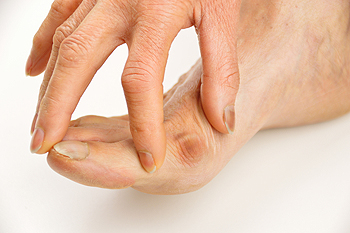
A bunion is considered to be a deformity where a bony lump that forms on the side of the big toe. It happens as a result of the big toe becoming misaligned, and it can push against the side of the shoe. Many people develop a bunion from genetic reasons, or from wearing shoes that do not have adequate room for the toes to move freely in. High heels fit into this category, and it is suggested to wear a shoe that has a lower heel and a bigger toe area. Some people have an abnormal foot shape, and this may also lead to developing a bunion. There are specific symptoms that are associated with a bunion. These can include pain that gets worse when tight shoes are worn and the big toe may become stiff. Additionally, the skin surrounding the joints in the big toe may be swollen and red. Severe bunions may require surgery for permanent removal and proper alignment of the joints. If you have a bunion, please confer with a podiatrist who can guide you toward the treatment that is correct for you.
If you are suffering from bunions, contact Dr. Thong V. Truong of California. Our doctor can provide the care you need to keep you pain-free and on your feet.
What Is a Bunion?
A bunion is formed of swollen tissue or an enlargement of boney growth, usually located at the base joint of the toe that connects to the foot. The swelling occurs due to the bones in the big toe shifting inward, which impacts the other toes of the foot. This causes the area around the base of the big toe to become inflamed and painful.
Why Do Bunions Form?
Genetics – Susceptibility to bunions are often hereditary
Stress on the feet – Poorly fitted and uncomfortable footwear that places stress on feet, such as heels, can worsen existing bunions
How Are Bunions Diagnosed?
Doctors often perform two tests – blood tests and x-rays – when trying to diagnose bunions, especially in the early stages of development. Blood tests help determine if the foot pain is being caused by something else, such as arthritis, while x-rays provide a clear picture of your bone structure to your doctor.
How Are Bunions Treated?
- Refrain from wearing heels or similar shoes that cause discomfort
- Select wider shoes that can provide more comfort and reduce pain
- Anti-inflammatory and pain management drugs
- Orthotics or foot inserts
- Surgery
If you have any questions, please feel free to contact our office located in Chico, CA . We offer the newest diagnostic and treatment technologies for all your foot care needs.
Are You Suffering From Ingrown Toenails?
Callus Formations and How to Deal With Them
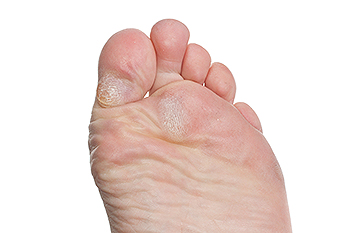
Calluses develop as the result of continued pressure on the skin that causes it to harden as a way of protecting itself. Anyone can develop a callus, regardless of their age. While calluses are not particularly dangerous, and not contagious, they can be both unsightly and uncomfortable. In many cases, they do not require medical attention. Some home remedies, such as using a pumice stone to file them down and rubbing in creams that help to soften them, are common. Unlike blisters and corns that form by rubbing against something solid, like a hard shoe, calluses are caused by pressure. If a bone in the foot is out of alignment, such as from a bunion or metatarsal malformation, a callus may form in the area. They also can be caused by poorly fitting shoes, walking, running, and other repetitive exercises. They commonly develop on the feet and heels, usually near a bony prominence. If a callus becomes painful and uncomfortable, it might be wise to see a podiatrist for an evaluation and safe removal procedure.
Everyday foot care is very important to prevent infection and other foot ailments. If you need your feet checked, contact Dr. Thong V. Truong from California. Our doctor can provide the care you need to keep you pain-free and on your feet.
Everyday Foot Care
Often, people take care of their bodies, face and hair more so than they do for their feet. But the feet are a very important aspect of our bodies, and one that we should pay more attention to. Without our feet, we would not be able to perform most daily tasks.
It is best to check your feet regularly to make sure there are no new bruises or cuts that you may not have noticed before. For dry feet, moisturizer can easily be a remedy and can be applied as often as necessary to the affected areas. Wearing shoes that fit well can also help you maintain good foot health, as well as making it easier to walk and do daily activities without the stress or pain of ill-fitting shoes, high heels, or even flip flops. Wearing clean socks with closed shoes is important to ensure that sweat and bacteria do not accumulate within the shoe. Clean socks help to prevent Athlete’s foot, fungi problems, bad odors, and can absorb sweat.
If you have any questions please feel free to contact our office located in Chico, CA . We offer the newest diagnostic and treatment technologies for all your foot and ankle needs.
Reminder: When Was the Last Time...?
Heel Pain in Children
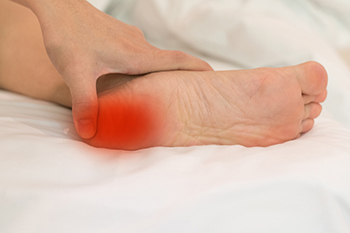
Children often complain of heel pain, and it is usually not serious. However, it is important to understand what is going on as such pain can arise for various reasons. If a child suffers from pain or tenderness in the back of the foot or ankle, limps, or walks on their toes, they might have Achilles tendonitis or Sever’s disease. Achilles tendonitis is an inflamed Achilles tendon. Sever’s disease, or calcaneal apophysitis, affects kids from five to eleven years of age and involves the Achilles tendon pulling on a growing heel bone. Both conditions can occur from overuse or a sudden increase in activity. Children performing repetitive movement as in sports like soccer, basketball, and track that involve running or jumping are more prone to heel pain. Rest, ice, compression, elevation, stretching, over-the-counter pain medication, and perhaps cushioned heel lifts usually provide relief, but ignoring symptoms can lead to worsening of the injury and sometimes chronic pain. Other less common reasons for heel pain in children are plantar fasciitis, fractures of the heel or foot, infections, tumors, or congenital problems. If one suspects a child has sustained a fracture or if pain persists beyond a couple of weeks, a podiatrist should be seen to examine your child’s feet, determine what the cause of pain is, and suggest an appropriate treatment plan.
Many people suffer from bouts of heel pain. For more information, contact Dr. Thong V. Truong of California. Our doctor can provide the care you need to keep you pain-free and on your feet.
Causes of Heel Pain
Heel pain is often associated with plantar fasciitis. The plantar fascia is a band of tissues that extends along the bottom of the foot. A rip or tear in this ligament can cause inflammation of the tissue.
Achilles tendonitis is another cause of heel pain. Inflammation of the Achilles tendon will cause pain from fractures and muscle tearing. Lack of flexibility is also another symptom.
Heel spurs are another cause of pain. When the tissues of the plantar fascia undergo a great deal of stress, it can lead to ligament separation from the heel bone, causing heel spurs.
Why Might Heel Pain Occur?
- Wearing ill-fitting shoes
- Wearing non-supportive shoes
- Weight change
- Excessive running
Treatments
Heel pain should be treated as soon as possible for immediate results. Keeping your feet in a stress-free environment will help. If you suffer from Achilles tendonitis or plantar fasciitis, applying ice will reduce the swelling. Stretching before an exercise like running will help the muscles. Using all these tips will help make heel pain a condition of the past.
If you have any questions please contact our office located in Chico, CA . We offer the newest diagnostic and treatment technologies for all your foot and ankle needs.
Why Live with Pain and Numbness in Your Feet?
Ways to Prevent Falls in the Elderly
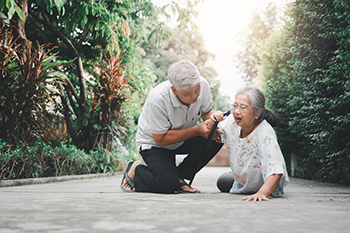
According to the CDC, one out of four seniors over 65 experiences a fall, and the odds are that once you have fallen, it will happen again. This often occurs as the result of diminishing balance, mobility and coordination as you age. Five simple ways to help prevent falls, and the injuries that may follow, include removing tripping hazards around the home, making stairs and bathrooms safer, wearing proper shoes and slippers, using a cane or walker, and doing exercises that both strengthen legs and feet and improve balance and coordination. First, it is suggested that you remove area rugs or mats that can be tripped over or that slide too easily, and clear hallways and walkways of clutter or other objects. Second, have railings installed on all stairways, including those on porches or home entry areas. Also, add grab bars to bathroom tubs and showers and make sure to use non-slip mats. Third, find shoes that provide support and fit well. Avoid going barefoot and walking around in socks at home. Instead get shoes and slippers with non-skid soles for safety both inside and out of the house. Fourth, it is amazing how many seniors refuse to use a walking aid out of vanity, but using a cane or walker is one of the best ways to avoid falls. Finally, see your podiatrist for information on how to strengthen your ankles and feet with exercises you can do at home. A podiatrist can answer any questions you may have on ways to prevent falling.
Preventing falls among the elderly is very important. If you are older and have fallen or fear that you are prone to falling, consult with Dr. Thong V. Truong from California. Our doctor will assess your condition and provide you with quality advice and care.
Every 11 seconds, an elderly American is being treated in an emergency room for a fall related injury. Falls are the leading cause of head and hip injuries for those 65 and older. Due to decreases in strength, balance, senses, and lack of awareness, elderly persons are very susceptible to falling. Thankfully, there are a number of things older persons can do to prevent falls.
How to Prevent Falls
Some effective methods that older persons can do to prevent falls include:
- Enrolling in strength and balance exercise program to increase balance and strength
- Periodically having your sight and hearing checked
- Discuss any medications you have with a doctor to see if it increases the risk of falling
- Clearing the house of falling hazards and installing devices like grab bars and railings
- Utilizing a walker or cane
- Wearing shoes that provide good support and cushioning
- Talking to family members about falling and increasing awareness
Falling can be a traumatic and embarrassing experience for elderly persons; this can make them less willing to leave the house, and less willing to talk to someone about their fears of falling. Doing such things, however, will increase the likelihood of tripping or losing one’s balance. Knowing the causes of falling and how to prevent them is the best way to mitigate the risk of serious injury.
If you have any questions, please feel free to contact our office located in Chico, CA . We offer the newest diagnostic and treatment technologies for all your foot care needs.
Do Your Child's Feet Hurt?
Gout Is Arthritis
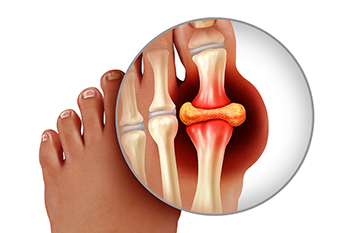
A common form of inflammatory arthritis is known as gout. It can be extremely uncomfortable and can cause severe pain. It frequently affects the joints in the big toe, and may make walking difficult. Gout develops as a result of a buildup of uric acid, which may come from specific foods, including red meat and shellfish, as well as drinking alcoholic beverages. In addition to pain in the big toe, common symptoms can consist of swelling, redness, and lumps that are painless under the skin. Prevention methods include losing excess weight, avoiding foods that can trigger gout attacks, and eating foods high in vitamin C. Additionally, implementing a gentle exercise routine may help to manage gout. If you have this type of pain in your big toe, please speak with a podiatrist who can discuss prevention techniques and offer treatment solutions.
Gout is a foot condition that requires certain treatment and care. If you are seeking treatment, contact Dr. Thong V. Truong from California. Our doctor will treat your foot and ankle needs.
What Is Gout?
Gout is a type of arthritis caused by a buildup of uric acid in the bloodstream. It often develops in the foot, especially the big toe area, although it can manifest in other parts of the body as well. Gout can make walking and standing very painful and is especially common in diabetics and the obese.
People typically get gout because of a poor diet. Genetic predisposition is also a factor. The children of parents who have had gout frequently have a chance of developing it themselves.
Gout can easily be identified by redness and inflammation of the big toe and the surrounding areas of the foot. Other symptoms include extreme fatigue, joint pain, and running high fevers. Sometimes corticosteroid drugs can be prescribed to treat gout, but the best way to combat this disease is to get more exercise and eat a better diet.
If you have any questions please feel free to contact our office located in Chico, CA . We offer the newest diagnostic and treatment technologies for all your foot and ankle needs.





